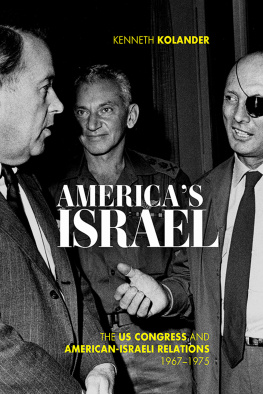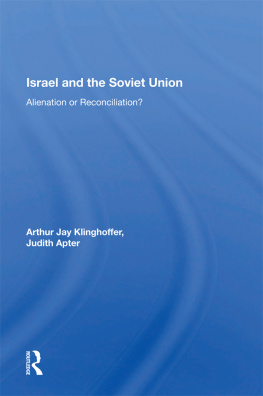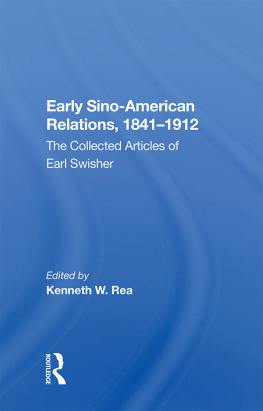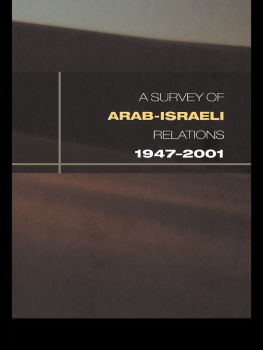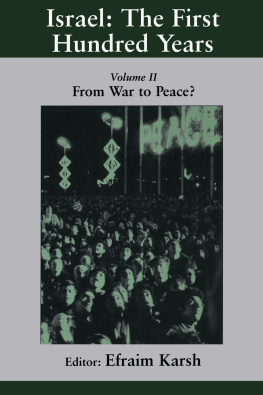Copyright 2020 by The University Press of Kentucky
Scholarly publisher for the Commonwealth,
serving Bellarmine University, Berea College, Centre
College of Kentucky, Eastern Kentucky University,
The Filson Historical Society, Georgetown College,
Kentucky Historical Society, Kentucky State University,
Morehead State University, Murray State University,
Northern Kentucky University, Transylvania University,
University of Kentucky, University of Louisville,
and Western Kentucky University.
All rights reserved.
Editorial and Sales Offices: The University Press of Kentucky
663 South Limestone Street, Lexington, Kentucky 40508-4008
www.kentuckypress.com
Parts of were originally published as Phantom Peace: Henry Scoop
Jackson, J. William Fulbright, and Military Sales to Israel, Diplomatic History,
Volume 41, Issue 3, June 2017, p. 567593.
Library of Congress Cataloging-in-Publication Data
Names: Kolander, Kenneth, 1981- author.
Title: Americas Israel : the U.S. Congress and American-Israeli relations, 19671975 / Kenneth Kolander.
Description: Lexington : The University Press of Kentucky, 2020. | Series: Studies in conflict, diplomacy, and peace | Includes bibliographical references and index.
Identifiers: LCCN 2020013204 | ISBN 9780813179476 (hardcover) | ISBN 9780813179490 (pdf) | ISBN 9780813179506 (epub)
Subjects: LCSH: United StatesForeign relationsIsrael. | IsraelForeign relationsUnited States. | United States. Congress.
Classification: LCC E183.8.I7 K64 2020 | DDC 327.730569409/047dc23
This book is printed on acid-free paper meeting
the requirements of the American National Standard
for Permanence in Paper for Printed Library Materials.
Manufactured in the United States of America
| Member of the Association
of University Presses |
Introduction
The United States and Israel share an uneasy alliance. On the one hand, the two countries need each other. The United States provides Israel with vital military and political protection that ensures its place in the Middle East. Israel serves as a dependable and important ally for the United States in a turbulent region marked by a considerable amount of anti-Westernism. Many Americans feel a cultural connection to Israel and appreciate having a U.S. stronghold in the region. Many Israelis are deeply grateful for American help, especially given Europes history of anti-Semitism, and dread the thought of ever losing U.S. support.
On the other hand, the two countries have divergent national interests that often lead to conflicts. American officials have criticized Israel for dealing unjustly with Arabs within and beyond its borders, and fear that Israel intends to hold onto substantial tracts of territory it took during the 1967 Arab-Israeli War. These longstanding issues complicate U.S. relations with the Arab world and weaken Americas global image. Israeli officials believe that U.S. policymakers are nave about Arab attitudes toward Israel and fear that U.S. aid and political support can be used to strongarm Israel into accommodating Arab states and nations that are bent on Israels destruction. Quite certainly, U.S.-Israel relations have an abundance of consensus, conflict, and anxiety.
This uneasy alliance did not happen all at once, but instead grew out of a special relationship and a Cold War strategic alliance. The United States formed a special relationship with the State of Israel many years ago, on May 14, 1948, the day of Israels modern founding. The special relationship, rooted in powerful cultural factors, amounts to an unshakable American commitment to ensure the survival of Israel. After the Holocaust, U.S. policymakers, along with many everyday Americans, felt a moral obligation to protect Israel. The special relationship required American political support and foreign assistance to secure Israels permanency in the Middle East.
The two countries also developed a strategic alliance during the Cold War. Time and time again, Israeli officials told their American counterparts of Israels strategic value in the Middle East. They could point to practical results. For example, the Israeli intelligence organization Mossad managed to flip an Iraqi pilot, Munir Redfa, who agreed to fly a Soviet MiG 21 from Iraq to Israel in August 1966. Israel eventually shared that technology with the United States, which helped American military planners, and especially U.S. pilots, to understand the capabilities of the Soviet fighter plane.1 At the behest of the Richard Nixon administration, Israeli forces mobilized in defense of King Hussein of Jordan during Black September in 1970. Although Israel did not directly intervene in the crisis, which ended in a decisive Jordanian victory over Palestinian and Syrian forces, the move signaled to Moscow that an American ally stood ready to act, if necessary, and also demonstrated to Washington that Israel could be counted on to advance American objectives in the region.
Israeli officials emphasized Israels strategic utility to justify the acquisition of more weapons from the United States, and to strengthen the bonds between the two countries. Some U.S. policymakers wanted Israel to become an American ally in a crucial region to contain communism, especially given the disastrous war in East Asia, which meant selling more weapons to Israel. U.S. military aid grants to Israel, which in 2019 have come to reach nearly $4 billion annually, grew out of the special relationship and, at times, served American strategic purposes. Yet one has to wonder at what point does U.S. military aid and political protection for Israel exceed the boundaries of either a special or strategic relationship? At what point does U.S. support for Israel become excessive to the point that it undermines other U.S. interests, as well as the pursuit of peace in the Middle East?
Neither the special relationship nor a strategic alliance properly frames U.S.-Israel relations since the 1970s. Rather, the two countries share an uneasy, yet durable alliance that contains elements of a special relationship and a strategic alliance.
This alliance, which continues into our present time, came into existence between the Six-Day War in June 1967 and the Sinai II Disengagement Agreement in September 1975. A formative moment happened when the Gerald Ford administration agreed to secret executive agreements with Israel, connected to the Sinai II agreement between Israel and Egypt in 1975, which created a new foundation for U.S.-Israel relations moving forward. The United States pledged to provide for Israels future economic and military needs and, at the same time, agreed to not force Israel to return Arab territories taken in 1967. The administration believed it needed to secure an agreement between Israel and Egypt to keep the peace process alive, to prevent the outbreak of war, and to continue drawing Egypt away from the Soviet Union. Unable to pressure Israel into going along with U.S. foreign policy, the Ford administration instead felt obligated to buy the agreement. With these open-ended and far-reaching commitments, Israel managed to get just what it wanted: virtually unlimited weaponry without American arm-twisting to give back Arab lands. In return, Israeli officials understood that the United States expected Israels full cooperation with any security issues that might arise in the region. As numerous U.S. legislators noted at the time, these agreements represented a monumental change in U.S.-Israel relations.




